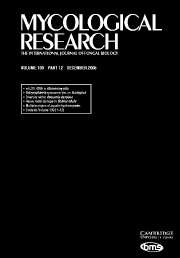Crossref Citations
This article has been cited by the following publications. This list is generated based on data provided by
Crossref.
Kouvelis, V. N.
Zare, R.
Bridge, P. D.
and
Typas, M. A.
1999.
Differentiation of mitochondrial subgroups in theVerticillium lecaniispecies complex.
Letters in Applied Microbiology,
Vol. 28,
Issue. 4,
p.
263.
Zare, R.
Kouvelis, V. N.
Typas, M. A.
and
Bridge, P. D.
1999.
Presence of a 20 bp insertion/deletion in the ITS1 region of
Verticillium lecanii
.
Letters in Applied Microbiology,
Vol. 28,
Issue. 4,
p.
258.
Mavridou, Annoula
Cannone, Jamie
and
Typas, Milton A.
2000.
Identification of Group-I Introns at Three Different Positions within the 28S rDNA Gene of the Entomopathogenic Fungus Metarhizium anisopliae var. anisopliae.
Fungal Genetics and Biology,
Vol. 31,
Issue. 2,
p.
79.
Boucias, Drion G
Tigano, Myrian S
Sosa-Gomez, Daniel R
Glare, Travis R
and
Inglis, Peter W
2000.
Genotypic Properties of the Entomopathogenic Fungus Nomuraea rileyi.
Biological Control,
Vol. 19,
Issue. 2,
p.
124.
Miranpuri, G
Valencia, E
and
Khachatourians, G
2001.
Microbial Biopesticides.
Nielsen, Charlotte
Sommer, Christian
Eilenberg, Jørgen
Hansen, Karen S.
and
Humber, Richard A.
2001.
Characterization of aphid pathogenic species in the genusPandoraby PCR techniques and digital image analysis.
Mycologia,
Vol. 93,
Issue. 5,
p.
864.
Sugimoto, Midori
Koike, Masanori
Hiyama, Naomi
and
Nagao, Hideyuki
2003.
Genetic, morphological, and virulence characterization of the entomopathogenic fungus Verticillium lecanii.
Journal of Invertebrate Pathology,
Vol. 82,
Issue. 3,
p.
176.
Pantou, Malena P.
Mavridou, Annoula
and
Typas, Milton A.
2003.
IGS sequence variation, group-I introns and the complete nuclear ribosomal DNA of the entomopathogenic fungus Metarhizium: excellent tools for isolate detection and phylogenetic analysis.
Fungal Genetics and Biology,
Vol. 38,
Issue. 2,
p.
159.
Roberts, Donald W.
and
St. Leger, Raymond J.
2004.
Vol. 54,
Issue. ,
p.
1.
Khachatourians, George G.
and
Uribe, Daniel
2004.
Fungal Genomics.
Vol. 4,
Issue. ,
p.
353.
Uribe, Daniel
and
Khachatourians, George G.
2004.
Restriction fragment length polymorphism of mitochondrial genome of the entomopathogenic fungus Beauveria bassiana reveals high intraspecific variation.
Mycological Research,
Vol. 108,
Issue. 9,
p.
1070.
Márquez, Marcela
Iturriaga, Enrique A
Quesada-Moraga, Enrique
Santiago-Álvarez, Cándido
Monte, Enrique
and
Hermosa, Rosa
2006.
Detection of potentially valuable polymorphisms in four group I intron insertion sites at the 3'-end of the LSU rDNA genes in biocontrol isolates of Metarhizium anisopliae.
BMC Microbiology,
Vol. 6,
Issue. 1,
Ghikas, Dimitri V.
Kouvelis, Vassili N.
and
Typas, Milton A.
2006.
The complete mitochondrial genome of the entomopathogenic fungus Metarhizium anisopliae var. anisopliae: gene order and trn gene clusters reveal a common evolutionary course for all Sordariomycetes, while intergenic regions show variation.
Archives of Microbiology,
Vol. 185,
Issue. 5,
p.
393.
Zimmermann, Gisbert
2007.
Review on safety of the entomopathogenic fungusMetarhizium anisopliae.
Biocontrol Science and Technology,
Vol. 17,
Issue. 9,
p.
879.
Kouvelis, Vassili N.
Sialakouma, Aphrodite
and
Typas, Milton A.
2008.
Mitochondrial gene sequences alone or combined with ITS region sequences provide firm molecular criteria for the classification of Lecanicillium species.
Mycological Research,
Vol. 112,
Issue. 7,
p.
829.
Yanaka-Schäfer, Fabiana Y.
Dall'Onder, Leonara P.
Panichi, Mariana C.
Mendes, Roberta G.
Fagundes, Nelson J.R.
Bandinelli, Josiane B.
and
Bogo, Maurício R.
2008.
Sequence analysis of the rDNA intergenic spacer of Metarhizium strains isolated in Brazil.
Genetics and Molecular Biology,
Vol. 31,
Issue. 1,
p.
116.
Khachatourians, George G.
and
Qazi, Sohail S.
2008.
Human and Animal Relationships.
p.
33.
Ghikas, Dimitri V
Kouvelis, Vassili N
and
Typas, Milton A
2010.
Phylogenetic and biogeographic implications inferred by mitochondrial intergenic region analyses and ITS1-5.8S-ITS2 of the entomopathogenic fungi Beauveria bassiana and B. brongniartii.
BMC Microbiology,
Vol. 10,
Issue. 1,
Augustyniuk-Kram, Anna
2011.
The parasite-host system as exemplified by the interactions between entomopathogenic fungi and insects.
Studia Ecologiae et Bioethicae,
Vol. 9,
Issue. 1,
p.
51.
Li, Ya
and
Cai, Shuang-Hu
2011.
Sensitive and Rapid Detection of the Insect Pathogenic Fungus Metarhizium anisopliae var. anisopliae by Loop-mediated Isothermal Amplification.
Current Microbiology,
Vol. 62,
Issue. 5,
p.
1400.




